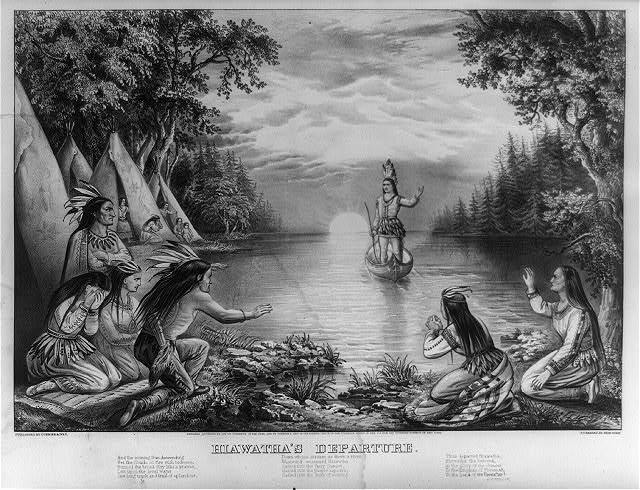
Scholar of religion Jonathan Bernier drops an interesting aside in his blog post, The Quest for the Historical Hiawatha:
From what I understand, virtually all archaeologists and historians who study the matter agree that the Iroquois confederacy–the bringing together into political and religious union the Mohawk, Oneida, Onondaga, Cayuga, and Seneca peoples–was carried out as a result of the work of the Great Peacemaker and his disciple, Hiawatha. There is, as best I can tell, little dispute about their existence, even though the earliest written accounts come from at least three centuries after their life. That should be instructive to mythicists regarding how actual historians approach their subject matter . . . . (my own bolding as in all quotations)
My first thought was that the reference to mythicists was an odd irrelevance that added nothing to the argument expressed. It was of even less relevance to mythicism itself given that its point bears no relationship to any arguments I have encountered in the serious mythicist literature (e.g. Doherty, Carrier, Price, Brodie, Wells).
My second thought was that it appears once again we have a scholar of New Testament studies advertising how out of touch his field is from other forms of historical methods pertaining to non-biblical topics. But no, that’s not quite correct, because clearly Jonathan Bernier is familiar with studies of oral history.
And my third thought was to wonder why serious scholars like Jonathan Bernier seem so bothered by mythicism that they appear to have any interest at all in making throwaway lines like the one in this Historical Hiawatha post. Why? What role does mythicism itself play in their minds that they should express any mindfulness of it at all in this way?
First thought: irrelevance to mythicists
JB speaks of mythicists as a homogenous entity who need basic instruction in how “actual historians approach their subject matter”. The implication is that insisting upon contemporary records as the primary grounds for accepting the historicity of any person or event is a misguided hyper-scepticism while the reality is that historians have no qualms in accepting the historicity of a figure on the basis of a three hundred year old oral tradition alone. And most importantly and with apologies to humanity’s porcine cousins, mythicists are pig ignorant of this fact.
The fact is that numerous studies amply demonstrate the unreliability of oral reports that are even contemporaneous with the persons or events they are supposedly reporting. Historians who have written about their craft regularly stress the importance of contemporary sources. At the same time no-one has ever insisted that without contemporary source corroboration we must maintain strong doubts about a historical report. We know well enough, for example, how historians of Alexander the Great must rely upon written sources that date centuries after the death of Alexander. However, historians have strong reasons for placing qualified trust in the basics written in those works. I won’t repeat that discussion originally posted at
and
One hostile critic of mythicism who often insisted that biblical scholars did history no differently from the way other historian worked once encouraged his readers to study how historians “really work” by perusing Gilbert Garraghan’s 1946 A Guide to Historical Method. Unfortunately the same critic had himself failed to read Garraghan’s own words on page 265 that said:
It is typical of popular tradition that it is first heard of long after the time when the events it reports are supposed to have occurred. Almost invariably there is a gap, more or less broad, between the events and their first appearance in recorded history. Such a gap occurring in the case of any report is enough to make it suspect from the start. Instances of such reports, found on examination to be unverified, are without number. Thus, unaccountably tardy first mention of them in written record of any kind is a major argument used by critics in discrediting such onetime general beliefs as the False Decretals, the Popess Joan, the authenticity of the reputed works of Denis the Areopagite. Again, no contemporary biographer of St. Thomas of Canterbury records that his mother was a Saracen princess whom his father had married in the Holy Land. John Morris, “Legends about St. Thomas,” The Life and Martyrdom of St. Thomas Archbishop of Canterbury( 2d ed., London, 1885), 52325.
That Luther committed suicide is a story first heard of some twenty years after his death, when it began to be circulated by persons hostile to his memory. H. Grisar, Martin Luther, his Life and Work,57578.
The “Whitman saved Oregon”story first became public many years after Whitman’s death. See Edward G. Bourne Essays in Historical Criticism.
The Ann Rutledge Lincoln episode appears to be mainly legendary. No mention of it occurs until thirty one years after her death. AHR,41 ( 1936): 283.
A crucial point to be noted about such beliefs as those indicated is that when mention of them in written record emerges for the first time, no reason is forthcoming to explain why mention of them bad not been made earlier.
Mythicist arguments that I have read do not cite the lateness of sources as a reason to believe Jesus was a mythical construction from the very beginning but they do acknowledge, as is good and standard practice among historians, that the relative lateness of the sources does lend support to other arguments that suggest we are entitled to at least question his historical existence. The only attempt I have seen to link any writings of mythicists with the argument that lateness of sources is itself a reason to disbelieve in the historicity of Jesus is Maurice Casey’s third chapter of Jesus: Evidence and Argument or Mythicist Myths? Casey’s case might have taken a quite different turn, however, had he accurately quoted the writings of mythicists instead of mischievously torching straw man fabrications.
That leads to the second thought . . .
Continue reading “The Quest for the Historical Hiawatha — & the historical-mythical Jesus debate”
